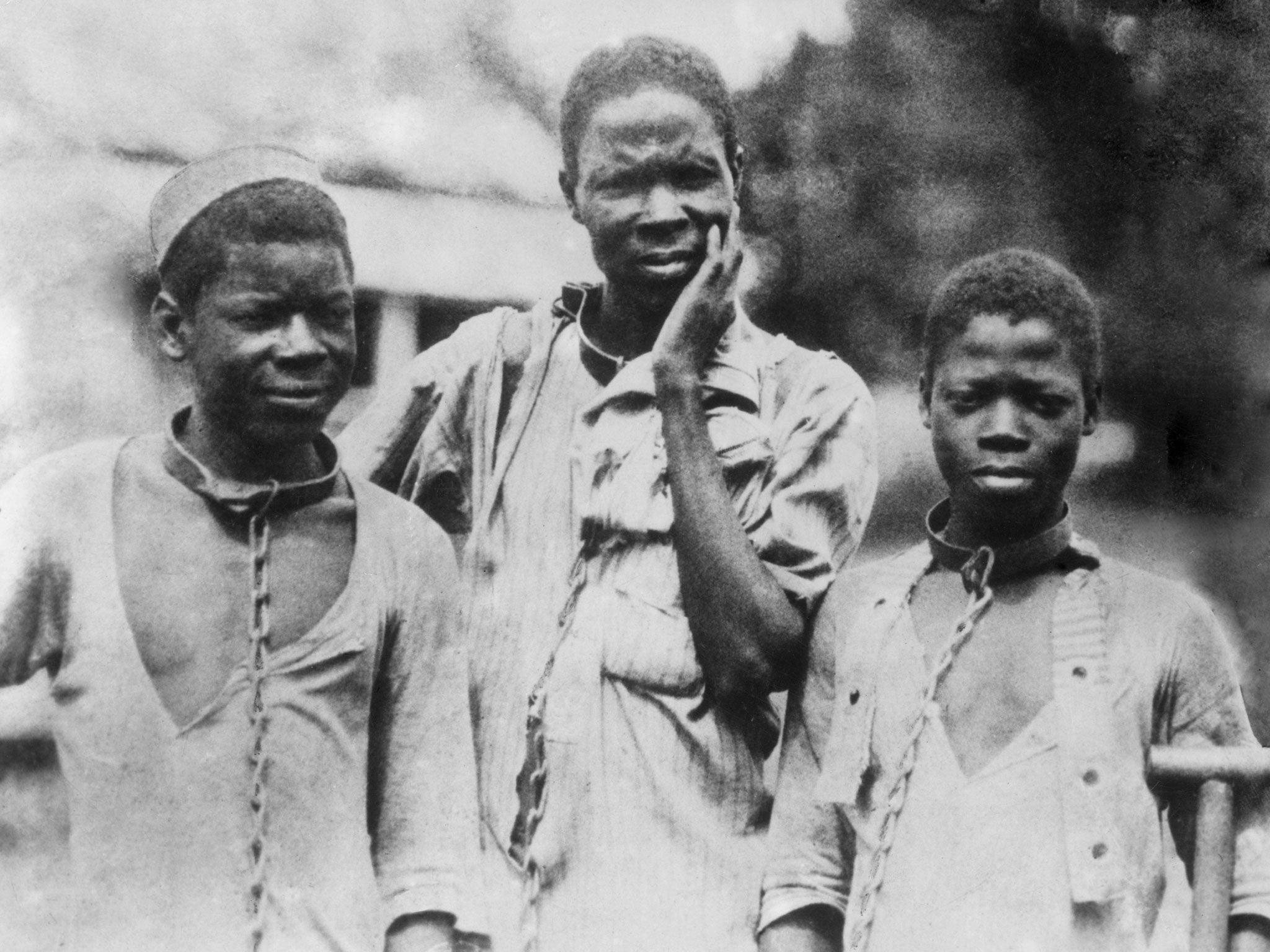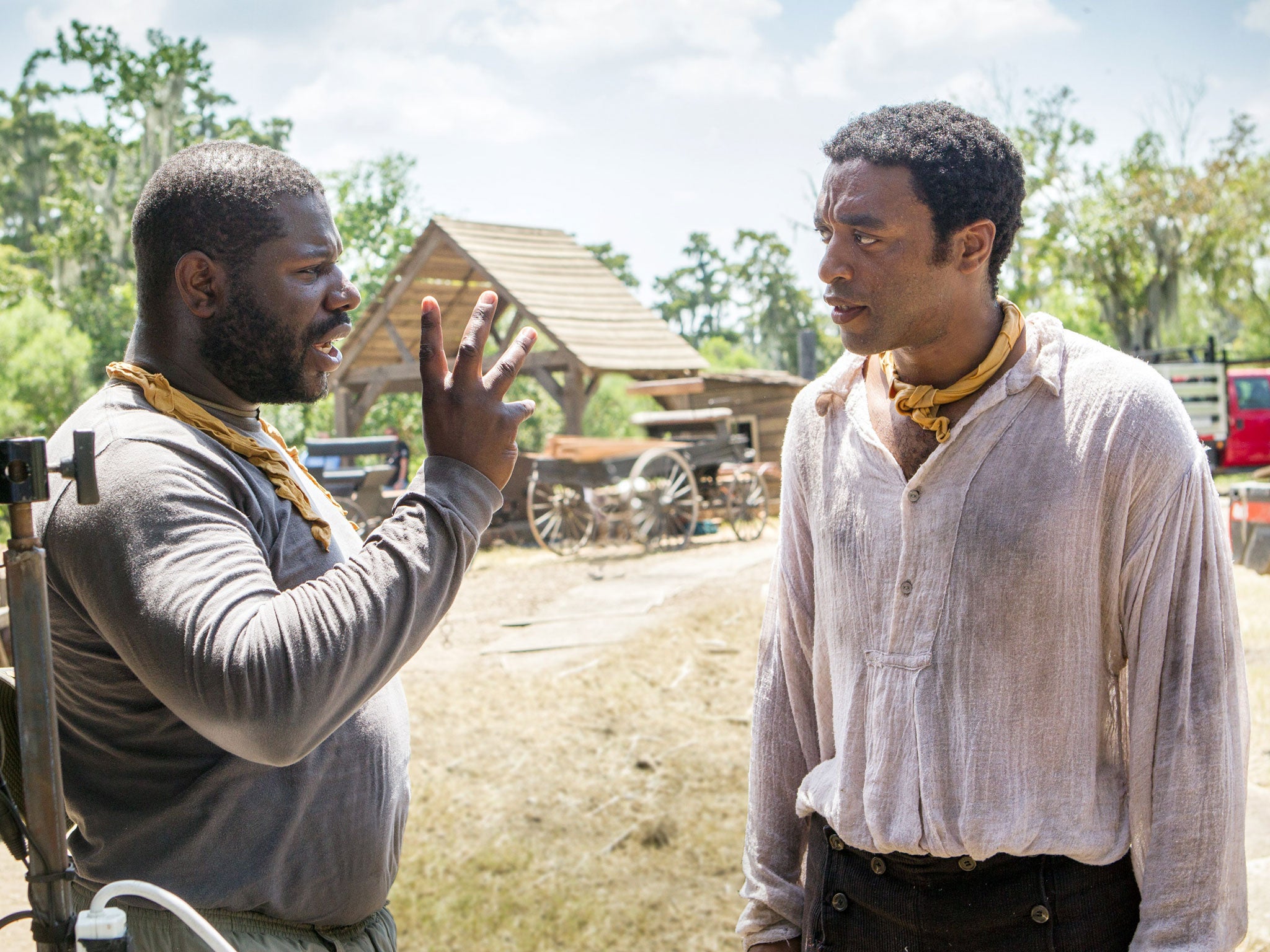Steve McQueen’s acclaimed film 12 Years A Slave is brutal in its honesty. But is it too much for American audiences?
The paucity of slavery movies is especially striking when compared with the hundreds made about the Holocaust

Your support helps us to tell the story
From reproductive rights to climate change to Big Tech, The Independent is on the ground when the story is developing. Whether it's investigating the financials of Elon Musk's pro-Trump PAC or producing our latest documentary, 'The A Word', which shines a light on the American women fighting for reproductive rights, we know how important it is to parse out the facts from the messaging.
At such a critical moment in US history, we need reporters on the ground. Your donation allows us to keep sending journalists to speak to both sides of the story.
The Independent is trusted by Americans across the entire political spectrum. And unlike many other quality news outlets, we choose not to lock Americans out of our reporting and analysis with paywalls. We believe quality journalism should be available to everyone, paid for by those who can afford it.
Your support makes all the difference.The New York Times, then less than two years into its distinguished existence, was among the first with the news. “We have obtained from Washington,” proclaimed its front page on January 20, 1853, “the subjoined statement of the circumstances attending the seizure and recovery of the negro man SOLOMON NORTHROP [sic], whose case has excited so high a degree of interest.”
It told the amazing tale of Solomon Northup, a free black man from upstate New York who was kidnapped and sold into slavery in 1841, and whose ordeal ended only after proof of his free status was provided to his owner. For some reason, the author of The New York Times story mis-spelled his name throughout. A few months later, Northup published his memoirs, Twelve Years a Slave. In 1984 came a television movie, Solomon Northup’s Odyssey. And now the film directed by Steve McQueen which, according to virtually every US critic, has rendered this year’s Oscars a foregone conclusion.
Enjoyable is not quite the word for this cinematic experience. Hollywood has taken the odd stab before at tackling America’s original sin. But this latest rendition of Northup’s story pulls not a punch – or more exactly spares not a lash – in its shattering depiction of the ghastliness of slavery. Never before has the brutal reality of the economic system that underpinned the antebellum South been so graphically, at times almost unwatchably, presented.
Everything about it feels authentic, right down to the language, the antiquated cadences and biblical rhythms of which are pitch perfect. Its historical accuracy has been vouched for by none other than Henry Louis Gates, the leading and occasionally prickly scholar on black America and its culture, and a consultant for the film. “It was much like studying… and I didn’t have to make any corrections,” he has said, calling it “the best film about slavery ever made from the point of view of a slave”.
Birth of a NationGone with the WindOther entrants include Stephen Spielberg’s fine movie Amistad, the underrated Sankofa, and most recently, of course, Django Unchained, Quentin Tarantino’s bloody action movie that received generally excellent reviews, but has been likened by some to a spaghetti western about slavery. By and large though, Hollywood has steered clear of the topic – other than, of course, Spartacus, separated by an ocean and two millennia from the great blight on America’s own history.
Arguably, the greatest impact was made by the 1977 mini-series Roots, based on Alex Haley’s novel, which commanded some of the largest US television audiences of all time. But even Roots – which tackled slavery and its evils in remarkably forthright terms – has drawn complaints that it presents the issue as a chapter of the wider immigration story that created the United States. The paucity of slavery movies is especially striking when compared with the hundreds made about the Holocaust.
Nor is Hollywood invariably squeamish, anxious not to upset the audiences on which the industry depends. Look no further than Saving Private Ryan, and the stomach-churning opening section on the Normandy landings, depicting war in its gory, unvarnished horror. But then Americans were the good guys – or, insofar as the Holocaust is concerned, at least not the bad guys. In 12 Years a Slave, it has been said, it took a non-American director such as McQueen, and a non-American star (Chiwetel Ejiofor, who plays Solomon Northup, is of Nigerian ancestry and grew up in England) to show slavery as it really was.
There may be some truth in this. Nonetheless, you could describe 2013 as America’s Year of the Black Movie. The Butler tells the history of the civil rights movement as witnessed by a butler at the White House, loosely modelled on Eugene Allen, a black butler who really did serve through eight presidential administrations.
Then there was 42, the story of Jackie Robinson, the first player to break the colour barrier in major league baseball, as well as Django Unchained. This autumn, the six-part documentary, The African Americans: Many Rivers to Cross, presented by Gates, ran on US public television. And now 12 Years a Slave. So why this plethora now?

Watch Apple TV+ free for 7 days
New subscribers only. £8.99/mo. after free trial. Plan auto-renews until cancelled

Watch Apple TV+ free for 7 days
New subscribers only. £8.99/mo. after free trial. Plan auto-renews until cancelled
One big reason is that the entertainment industry is catching up with the fact that the US has its first black President. The election of Barack Obama, the African-American who beat the whites at their own game, has undoubtedly made admission of guilt easier. The liberal conscience has been partly assuaged and embarrassing subjects may be tackled more openly (even though Obama’s heritage is not of slaves, but as the mixed race son of a Kenyan studying in Hawaii, about as far from Dixie as it is possible to get in the 50 states).
But the impact of 12 Years a Slave, brilliant movie that it is, should be kept in perspective. The critic’s embrace and the lavish Oscar predictions have not yet been matched at the box office. To be sure, it has been much more than a succès d’estime, but not exactly a blockbuster. Revenues in the US, where it has been showing since mid-October, total roughly $39m to date, more than respectable for a movie which is part-art house, part-general release.
This though is far behind the $95m grossed by 42, and The Butler’s $114m, and represents a mere pittance to the $300m-plus run up in barely seven weeks by Frozen, Disney’s latest feel-good animated offering. The exception has been Django, which thanks largely to the Tarantino imprimatur, grossed $160m-odd at home, and $262m abroad. Every indication is that 12 Years a Slave will be a big hit abroad, especially if it scoops the Oscars pool – but not that big.
On the other hand, it’s unfair to use the modest domestic earnings of McQueen’s film to claim that Americans at large still refuse to face the facts of their country’s past. Audiences go to the movies to be entertained, to be transported to another world, to be amazed. Less often, however, to be chastened, shamed and mortified. Would the British, one wonders, flock to a film, however well-made and acted, that unflinchingly depicts cruelties inflicted in the name of Empire on some unfortunate native people, featuring the same nauseating assumptions of righteousness and superiority as in America’s slave-owning South?
12 Years A Slave is the most damning portrait of the old South imaginable. It is shot in a Louisiana where even mother nature is not welcoming: skeletal trees, draped in Spanish moss, that stand guard over oily swamps; the lush but stifling vegetation of the plantations, the sapping summer heat, rising like smoke from the cotton fields.

And that’s before you get to Edwin Epps, the plantation owner into whose hands Solomon Northup – now known by his slave name of Platt – has the misfortune to fall. Epps regards his slaves as a subspecies, mere chattels whose only reason for preservation is their value as labour. He finds justification for his casual brutality in the scriptures: “And that servant which knew his Lord’s will and prepared not himself, neither did according to his will, shall be beaten with many stripes” (Luke 12:47).
However terrific 12 Years a Slave may be, though, its social significance should not be over-estimated. But is unlikely to be the message trumpeted by liberal glitterati from the stage of the Kodak Theatre in Los Angeles, should the film make good on the Oscar predictions.
Of course, it has much contemporary relevance. Race, you will not be amazed to hear, is still a problem in the US, albeit a lesser one. The legacy of the Civil War, fought by the South to maintain slavery, is still visible. Republicans may have replaced Democrats as the region’s dominant party. But its conservatism in some respects is little changed.
Look no further than the staunch opposition to gay rights and the widespread quest for more stringent rules for elections, a thinly disguised attempt to turn back the civil rights clock by suppressing the minority vote, not least of blacks.
And who would deny that the visceral dislike of Obama among some of today’s Republicans reflects a sense that a black President, just like an educated, accomplished black such as Solomon Northup in the 1840s, offends the proper order of things?
But none of this will be changed by a single magnificent film – even one, to borrow those long-ago words of The New York Times, “whose case has excited so high a degree of interest”.